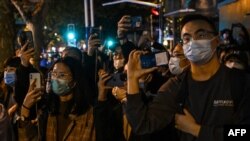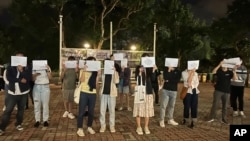As protests continue in cities across China over the government's harsh “zero-COVID” policy, a separate battle is taking place on social media sites within China and around the world, a fight that is testing the strength of China's online censorship apparatus, known as the Great Firewall.
Some protesters in cities such as Beijing and Shanghai are trying to circumvent government censors who are believed to use an automated system to help block prohibited content.
According to Paul Mozur, a reporter for The New York Times, protesters are using video filters such as script that layers over video or posting videos of videos, techniques aimed at making it harder for censorship algorithms to detect and block.
"Ultimately, it's not that the censorship apparatus is failing, it's just hit [its] natural limit," he wrote on Twitter. "When you have this many people posting this much and being creative, the world's best internet control regime loses."
Over the weekend, researchers noted that outside of China, when people on Twitter try to share tweets about the protests and the ensuing crackdown at the hands of police, Chinese language accounts intervened to block the information from spreading.
"Numerous Chinese-language accounts, some dormant for months or years, came to life early Sunday and started spamming the service with links to escort services and other adult offerings alongside city names," according to The Washington Post.
"The result: For hours, anyone searching for posts from those cities and using the Chinese names for the locations would see pages and pages of useless tweets instead of information about the daring protests as they escalated to include calls for Communist Party leaders to resign."
The Guardian reported that "Chinese bot accounts – not operated by humans – are being used to flood the social networking service with adverts for sex workers, pornography and gambling when users search for a major city in the country, such as Shanghai or Beijing, using Chinese script."
Observers have noted for weeks that Twitter may be vulnerable to any number of attacks or disinformation campaigns since its new owner Elon Musk laid off more than half the staff, including some who worked on protecting the service from bots.
Since Twitter is blocked for most people in China, some speculate that the bot attack is designed to tamp down the spread of information about the protests outside the country.
Alex Stamos, director at the Stanford Internet Observatory, wrote in a tweet Monday that his initial analysis "points to this being an intentional attack to throw up informational chaff and reduce external visibility into protests in China. (Twitter being blocked for most PRC citizens)."
The protests are unusual in China and may represent a test of Chinese President Xi Jinping's authoritarian regime.
"The absolute limits of the most sophisticated online control system in the world are being tested in a way they have not before," tweeted Mozur of the Times.
Ji Feng, a former student leader of the 1989 Tiananmen Square pro-democracy protests, told VOA that students are "jumping over the great firewall," using VPNs, or virtual private networks, to gain access to information.
People know what the truth is, he said.
"When the time comes, every generation of young people will shoulder their mission," he said. "When history demands them to take responsibilities, they will not hesitate to take their responsibilities."
Adrianna Zhang contributed to this report.









